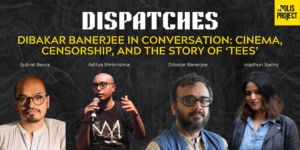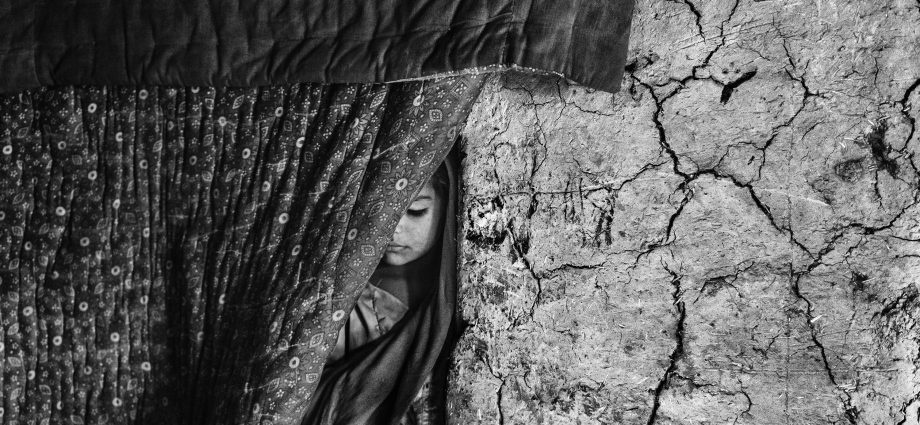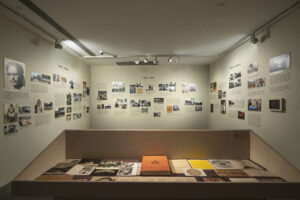

It has been snowing for the more than thirty-six continuous hours, a relentless storm that is good for the perched earth after a year of drought, but leaves the body craving for an insatiable desire for warmth.

The 160 families who live in the Hussain Khail refugee camp, one of the fifty-four in the outskirts of Kabul, have been there ten years or ten days; knee-deep in frozen mud, they let life go by. They all belong to the same clan and come from different villages in Kunduz province. Caught in the crossfire between the Afghan government and the Taliban, they had no other choice but to flee – victims of an advancing frontline, taken by surprise by the disasters of war: at lunch, on the road, while visiting a relative.
Those who live in Hussain Khail are the ones who are defined by statistics as collateral damage – they are among the 370 thousand internally displaced people.

Interrupted lives, stuck in a suspended time.
Incoherent narratives between an alien present and a past that precedes the great blast. Their tales have a defined before, made of clear and recognisable events; a confused after, full of pain, amnesia, reconstructed in broad terms; and a now that is solely made of stasis.
What happens when a bomb goes off ?
How is the moment of devastation and the present reconstructed – a present in a mud house, in a merciless winter, in an unknown city?

Noise. Dirt. Blood. Noise. Noise. Noise. Smoke. Cries. Shouts. Desperation. Pain.
Blood – one’s own mixed with that of other. And more shouts. Ears go deaf. The pain of the body and the pain of the soul.
Smoke. Fire. Smoke. Rubble. The ruins of lifelong dreams.

Oscillating between consciousness and unconsciousness. There is no time. But adrenaline pushes forward, anesthetizes everything until the dust finally settles and one looks around. And understands what is left and who is no more.
Pieces of lives and bodies – to pick up, to recognise and to honour. But there is no time. Fights continue, and, after the great blasts, bullets keep flying. There is caring for the living and crying for the dead.

Crouching amidst the rubble. Panic, disconcertment and immobility.
To keep pieces together, assist those who are wounded, avoid being hit in other attacks, attend to the dead and wait for someone to come, to go, to be taken somewhere, god knows where, without looking back, only with the clothes on their back, without knowing if there would ever be a return.
And even if there were a return, what would it be towards? Towards a destroyed home? Towards the empty hole where once used to rest the roots of an ordinary life that now no longer exists? The fear of being immersed again in a place of disaster takes away the desire to return; deprives of the possibility to go back home; prevents from even thinking about home: home is a luxury of the past, whilst the now and the forever are in a state of permanent transition.
And when, after the great blast, the curtain of smoke raises on the horror that is left, a lifetime won’t be enough to deal with it. How does one handle the burden of such devastation? How does memory get distilled for a person to be able to still breathe?
And yet, one must look ahead – or at least must keep surviving. The future is in the hands of God, says Khal Bibi. Her concern about the present is that her children could get something to eat.

Khal Bibi remembers that she left at six in the morning and arrived in the middle of the night, an interminable journey for the mere three hundred kilometres that separate Kunduz from Kabul. In the truck with her was her cousin and nine other people.
Khal Bibi took her dead along and buried them in a cemetery not far from the camp. Every root has been severed from the village of Siab, there isn’t even a tomb to return to and honour.

And now, there is a never-ending now, a horizon without perspective. A transience that stinks of permanence. In the camp, Khal Bibi washes clothes, cleans people’s houses and looks after those who are ill to earn a couple of dollars a day, enough to guarantee some food to the children, but not enough to pay for the medicines that her son would need. Besides feeding him and hoping he’ll heal, there is not much more that she can do.
In the camp, life is suspended in a time in between, between before and maybe, waiting for time to pass – heading towards an unclear direction.





